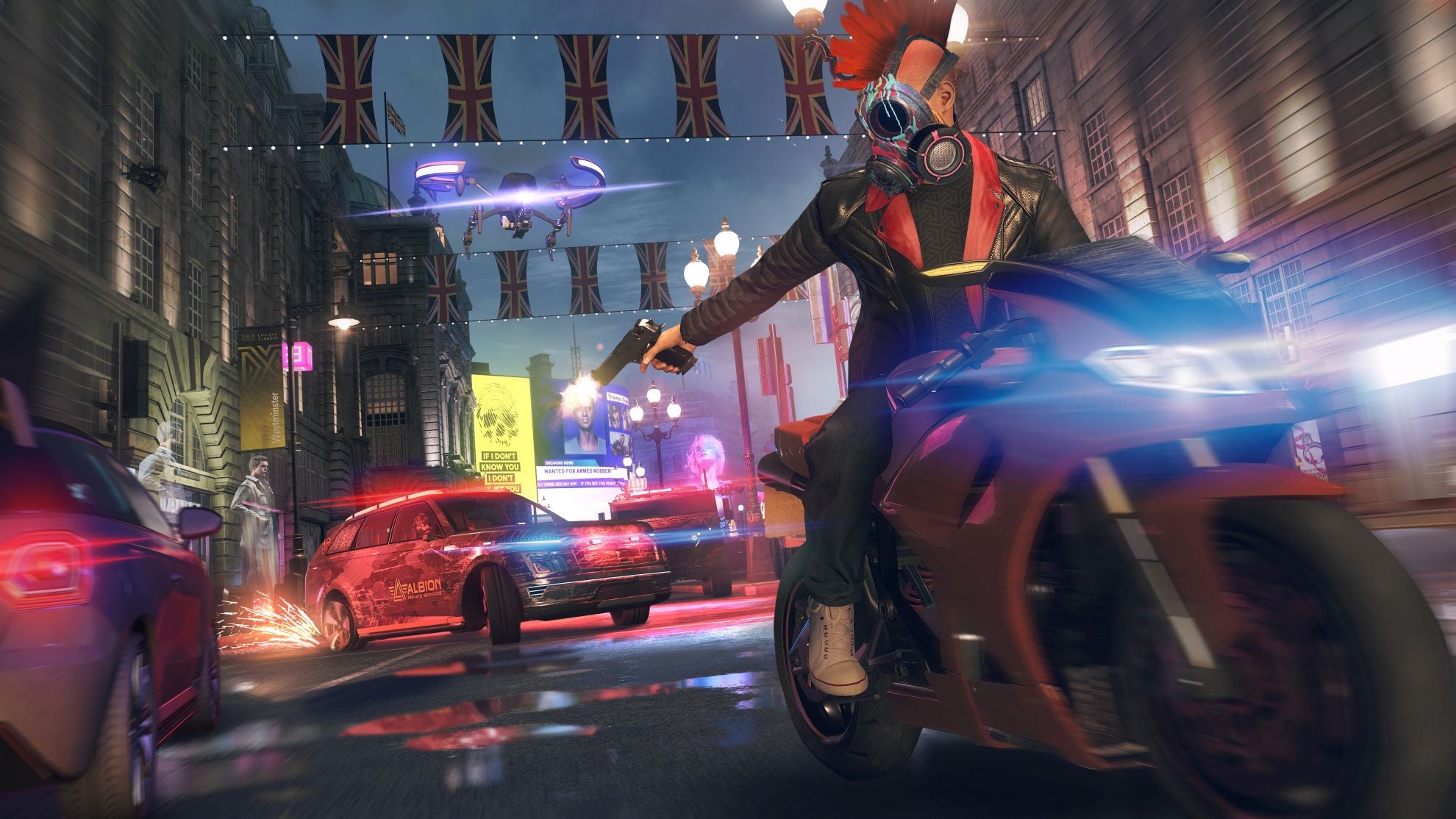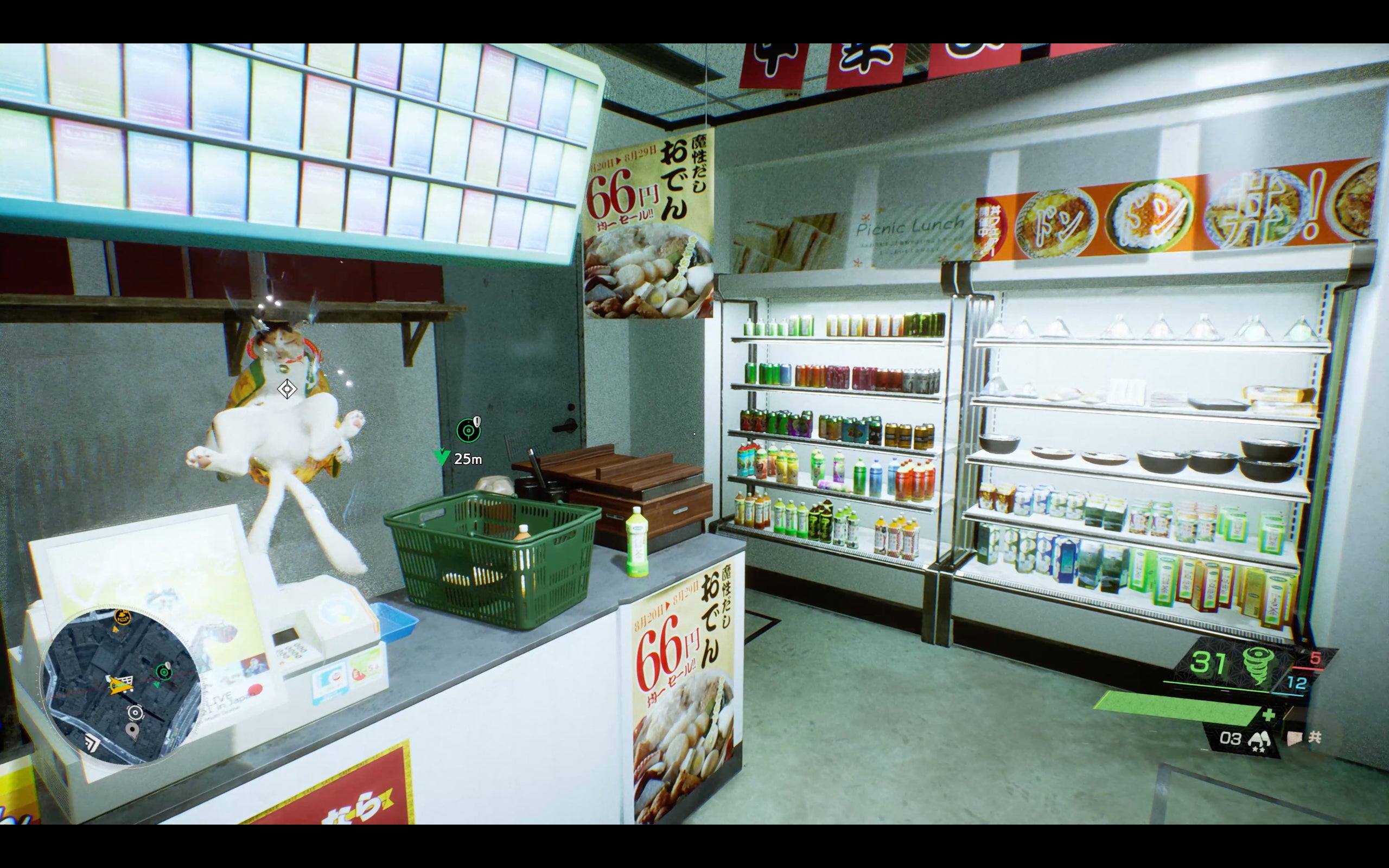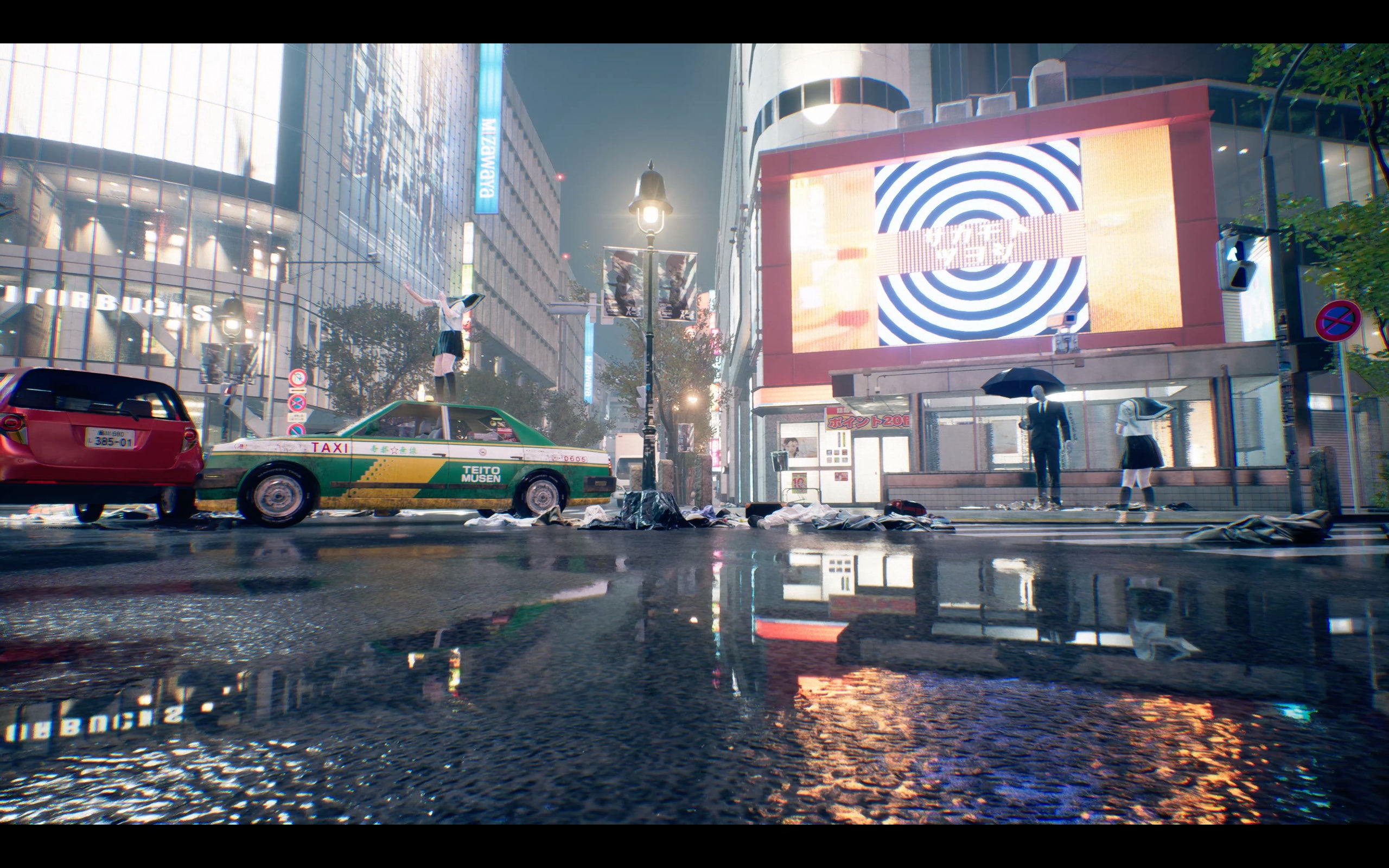Products You May Like
Ghostwire: Tokyo’s exploration loop is a brilliantly elaborate conceptual pun. It is this game’s version of the ‘Tower Unfogs Map’ mechanic popularised by Assassin’s Creed. Here, instead of climbing stuff and checking your watch as the camera whips around some murderous aristocrat holding an unlikely pose atop the Bastille (or whatever), you cleanse Torii gates of demonic influence, which rather usefully clears the streets of literal fog. I’m not sure if it’s intended to be funny, but regardless, it’s a smirk-worthy meta-twist on a now ubi-quitous gaming trope that can be found everywhere from Zelda to Mad Max.
It’s become something of a lightning rod for online complaints about the predictability of open-world design. The dreaded Ubisoft Towers; their mere presence implying that whatever game they loom over is, often in stark contrast to pre-release marketing, another bloated Icon Janitor sim. Another ‘Assassin’s Creed But’.
Assassin’s Creed but… you’re hunting robot dinosaurs. Assassin’s Creed but… you’re Spider-Man. Assassin’s Creed but… you’re in a vaguely problematic caricature of Cuba, and the bad guy from Breaking Bad has been given about three minutes of screen time in a desperate attempt to lend this bollocks some prestige. The sheer number of these games seems excessive, especially considering that Assassin’s Creed itself comes in a multitude of flavours spanning the entire latter half of recorded history, encompassing genres as disparate as stealth action, pirate simulator, and Copying The Witcher 3.
So, the market for blockbuster games is saturated with derivative Ubisoft Open World Games and, er, their derivatives. And everyone’s bored sick of them. Except, they clearly aren’t. The last Assassin’s Creed game made more than one-billion actual dollars. Not Canadian ones either, which would still be an absurd amount of money. American ones. Which means there’s still an absurd amount of money left over once you factor in grown up stuff like, I don’t know, publisher fees and corporation tax and things.
For such a despised formula, it’s an extremely successful one, and not just for its home stable. People who audibly groan whenever they announce a new Assassin’s Creed will happily gobble up the next Spider-Man or Ghost of Tsushima. Even critical darling Breath of the Wild, which we all remain besotted with after all this time for its unapologetic Nintendo-ness and beautifully interacting systems is, whether you want to admit it or not, a Ubisoft style open world game with towers to ascend and icons to janit. So what is it about Ubisoft’s specific approach that attracts so much vocal disdain? In terms of their game design, at least.
On the surface, Tango’s Ghostwire: Tokyo and Ubisoft’s Watch Dogs: Legion seem vastly different. One is a lonely supernatural thriller set in the abandoned streets of Shibuya, played in a tight first-person perspective for tense close-quarters encounters with eldritch monstrosities that draw heavily on contemporary Japanese horror. The other, as the name implies, features legions of potential player characters in a vigorously not abandoned near-future London, which is played with a third-person camera grandly pulled back for taking in the sights and sounds of a city with more recognisable landmarks per square-mile than arguably any other major metropolis. Ghostwire Tokyo wants you to worry about what might be around the next corner. Watch Dogs lets you see around it, and manipulate the world from the shadows. In essence, one game is about being haunted, the other is about being the ghost.
But there’s a tonne of crossover beneath the surface. Both of them are Ubisoft-style open-world games set in a contemporary real-world city, featuring a big to-do list, in which the player is tasked with liberating the city’s population from an oppressive force. There’s also an emphasis on raytraced puddles, although that’s just evidence of Britain and Japan’s startling similarity as countries (maritime nations with a constitutional monarchy, bad weather, and a culture of weaponised politeness).
Mechanically, they are as remarkably close as all the other games of their type. The same fundamentals, heavily remixed. Detective vision. Doing X to reveal Y. RPG-lite player progression. What’s interesting is that Legion is configured in such a way that no single part of it sticks the landing, while Ghostwire Tokyo is – for all its faults, many of which it shares with Legion – a hugely satisfying package, which does a couple of things extremely well and a bunch of other things just barely competently enough to get by, but certainly enough to leave Legion in the dust as far as Metacritic averages are concerned (unless you’re annoyingly pedantic about the platforms you compare).

Legion is a sprawling, convoluted mess with very little in the way of personality, having engineered itself out of one with its “play as any NPC” USP, about which the kindest thing I can say is that it probably seemed like a clever idea on paper. It also frightfully misunderstands the location it portrays: London is not, by any stretch, a driving city. It is a place where life is mapped out on train lines. Its grand rail stations are cathedrals to commerce: thriving hubs teeming with the bustle of metropolitan life. The Watch Dogs version, in contrast, has all the iconic stations closed down and boarded up, and relegates the tube to a loading screen. It has no sense of place. It has no verisimilitude. It’s a strange version of London as imagined by North Americans. It is, like the Thameslink project, a load of ill-conceived nonsense that’s baffling to anyone who actually lives there. Although they did turn Vauxhall tube station into a stunt ramp, fulfilling every idle fantasy of anyone who’s ever walked past it.
Ghostwire Tokyo’s authenticity appears to be a lot more genuine in contrast. It absolutely nails the atmosphere of wandering around urban Japan in the wee hours – the street furniture, the convenience store shelves of hot or cold Boss Coffee and Onigiri, the precise colour and diffusion of the light – it’s all perfect (aside from the demon invasion and the prevailing sense of mortal dread). The world feels painstakingly created by people who intimately know the source (Tango Gameworks is actually based near Shibuya, and not on a different continent, which probably helps). This is not to say that games should only be set in places familiar to the developers, only that their settings should feel tangible.
Most importantly, Ghostwire is a much shorter, more curated experience. Clearing a Torii gate will reveal a single-digit number of sidequests, not several dozen. Collectibles tend to have tangible gameplay and story benefits. In general, the focus is far tighter. Compared to bloated behemoths like AC: Valhalla, it’s lean and snappy, and fails to outstay its welcome, despite being – if you’ll permit me to be reductive – the same bloody game.

The precious little we know about the upcoming Assassin’s Creed Infinity does suggest, if you squint hard, that Ubisoft is course-correcting away from bloat. We’re told that it will be a platform for blockbuster vignettes – big stories told through smaller experiences. In theory, the same sheer amount of AssCreed offered by Valhalla, but much more varied, and fed to us in bitesize chunks over a number of years. It sounds too good to be true; a way to have several cakes and eat them all. It’s an experiment which I hope pays off, but perhaps what’s most welcome are the rumours of an upcoming Valhalla spin-off which will take players on a thoroughly linear, stealth-focused adventure as Basim.
Without being a businessy sort of person, it’s tempting to think that Ubisoft really doesn’t need to trial-and-error its next steps. Almost every other developer of its style of game has made a gift wrapped feasibility study for Ubisoft that reveals what might happen if it slashed the amount of content in its flagship properties, narrowed focus on the fundamentals, and committed to eschewing longevity for personality. They all say that it’ll be fine, probably?
And if all else fails, just make sure you nail the location. Nobody would give a shit about Ghostwire Slough.
